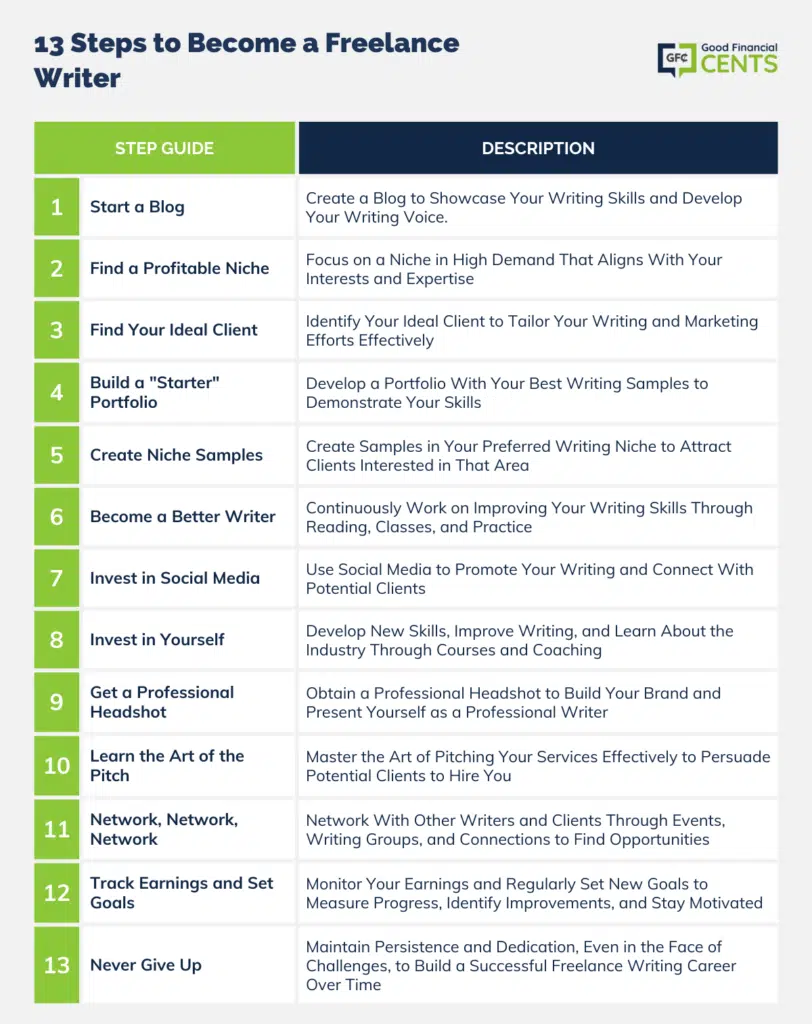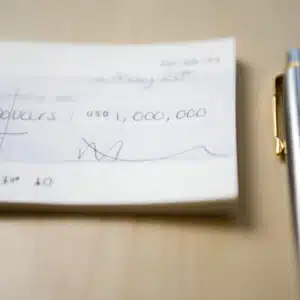If you’re interested in learning how to become a freelance writer so you can earn an amazing income from home, this post is for you.
Imagine being your own boss, having nearly unlimited income potential, and being able to work in your pajamas if you want to. Instead of slaving away in a cubicle all day, you rely on your creative talents – and your rigid work ethic – to build the life of your dreams.
Without an employer to answer to, you’re free to take as much time off as you want.
While that freedom paves the way for countless family vacations, it also makes it easy for you to be a better mom or dad – the type who shows up for parent breakfasts and waits patiently at the bus stop each day.
You’re grateful, but you work hard. Because, no matter what, you cannot fathom working for anyone else again.
Failure is not an option. You will succeed, or you will die trying!
How I Became an Online Freelance Writer
Table of Contents
I’m a 41-year-old mother of two, and this is my life. But, I wasn’t always so fortunate.
Before I learned how to become a freelance writer, I worked in a thankless professional job that imposed countless demands on my time and my health.
I worked long hours, weekends, and holidays, watching my life (and my children’s lives) tick away while I sacrificed everything for around $40,000 per year.
My kids were in full-time daycare, but they only got the scraps of a parent even when I was home. Our daily routine was pure misery. Wake up, dress to the nines with full makeup and hair, get the kids ready, scramble to get to daycare then to work by 8:00.
Hate my life until 5:00, throw together a sad dinner, bath time, laundry, chores, read a few books, then melt into a pile of disgust and despair.
Eventually, my husband and I decided we wanted more out of life – more freedom, more money, and more time for ourselves.
Since we weren’t sure what to do, we started a blog – ClubThrifty.com – in 2011 as a way to document our financial lives. We weren’t sure where it would lead, but we hoped it would lead somewhere.
In the meantime, I began leveraging my online presence (and my scarce free time) to pursue my passion – writing. For a long time, my husband and I worked full-time and built our online business during our spare time.
That often meant getting up at 5:00 a.m. to write before heading to our real jobs, blogging, and writing on weekends and holidays, and sacrificing all our free time.
The ordeal was absolutely draining, and I wanted to give up all the time. Fortunately, my husband never let me give up my dreams. I took a few weeks “off” here and there, but I always jumped right back in.
Fortunately, our hard work eventually paid off. These days, my husband is a full-time blogger who finally makes six figures running our website. I write online content for a living, earning an average of $20,000 – $30,000 per month writing articles, book chapters, and slideshows for a variety of websites and individuals.
I work extremely hard, but my new life puts my old one to shame. Instead of schlepping by with 15 PTO days per year, we now travel around 12 weeks annually. With more money at our disposal, we max out our retirement accounts and invest in real estate.
Most importantly, I am the type of parent I have always wanted to be – the type who is always home and available for my kids. While the money is great, this is the best part of our success.
How to Become a Freelance Writer
Over the years, thousands of people have asked me how I transitioned from a 9-5 office jockey to a freelancer who barely gets dressed and earns six figures.
With that in mind, I created a course specifically for writers who want to build online careers – EarnMoreWriting.com.
While much of the advice I offer is common sense, I share a lot of the lessons I learned the hard way. Many course participants with writing skills or even untapped talent have benefited tremendously from hearing “what not to do” and having a freelancing roadmap to build off of.
If you’re angling to build a freelance career from home, it’s easy to spin your wheels without ever knowing where to start. Here are 13 steps anyone can take as they start on the path toward freelance success:
Step 1: Start a Blog
While I don’t credit all my freelance writing success to my blog, I will say that starting a blog makes building a freelance career considerably easier. After all, your blog can serve as your “online home,” or a place potential clients can easily find you on the web. Trust me, that’s a lot better than having no online presence at all — especially when you’re first starting out.
In the meantime, having a blog shows anyone who cares that you have a very specific set of skills you probably need in most freelance jobs anyway. For example, having a blog shows potential clients you can:
- Write, edit, and publish your own posts
- Use WordPress to schedule content
- Add photos and links to the article
- Perform basic tasks to increase SEO for the content you write
Having a blog also shows clients you know how affiliate marketing works, which is important for freelance writers who have clients who monetize their content.
Separately, there are also many ways you can earn extra money with a blog. This can help you diversify your finances, meaning you can use your blog income to supplement your freelance writing income.
Step 2: Find a Profitable Niche
One of the biggest roadblocks new writers face is figuring out who they are and what they should write about. If you can nail down your passion, an area of expertise, or your areas of interest, it’s a lot easier to find writing jobs in your niche.
Roshni Gandhi is an attorney who signed up for EarnMoreWriting.com because she wanted more freedom in her life and her career. She took the advice in my course to “find herself” quite literally, choosing to leverage her lawyer skills to find writing jobs that apply to her area of expertise. Gandhi also does a ton of ghostwriting, mostly because it pays well and lets her leverage her professional knowledge.
At the time of this writing, she was earning between $3,500 and $5,000 per month creating online content, and that’s on top of the income she earned as an attorney. When it comes to finding your “passion,” her advice is similar to mine:
“Pay attention to the topics and niches that pique your interest,” says Gandhi. “There is a good chance that your interests align with paid writing gigs, and that will be your ideal match.”
What are you obsessed about? What are you already reading about? What skills from your day job can translate into a writing career?
Answer these questions and you’ll be one step closer to finding where you belong.
In the meantime, you should be aware that some niches in freelance writing are more profitable than others. For starters, you’ll earn more money if you’re willing to write about products and services within industries that have the budget to pay you.
Examples of profitable niches in freelance writing include:
- Personal Finance
- Healthcare
- Higher education
- Banking
- Health and beauty
- Politics and government policy
If you are hoping someone will pay you to write a personal diary, on the other hand, you may earn $0 as a freelance writer.
Step 3: Find Your Ideal Client
Finding your freelance writing niche is important, but this step goes hand-in-hand with finding the type of client you want to write for. Generally speaking, you’ll likely start out writing for smaller publications, businesses, and even other bloggers, but the goal should ultimately be moving up to more established, better-paying clients.
You might be surprised at the sheer number of companies that hire freelance writers over the course of any given year. Examples of people who have hired me to write content include:
- Major publications with millions of readers
- A campground owner who wanted me to write a 2,000-word application for an award she wanted
- Financial advisors who hire me to ghostwrite
- A medical device company had me write their product pages
- An author who had me write a few chapters for his book
These are just some of the unusual examples I have encountered, but there are plenty of others. In reality, your freelance writing clients could be:
- Small business owners who need blog posts
- Major corporations
- Online businesses
- Magazines that want new content
- Non-profit organizations
- Busy professionals who need help
- Start-up companies who are building their online presence
Over time, you’ll probably find you like working with some types of clients more than others…and that’s perfectly okay! At the end of the day, a client is a good fit if the pay is great and you truly enjoy the work. If you’re getting paid to write something unusual but you’re pretty happy with the arrangement, that’s really all that matters.
Step 4: Build a “Starter” Portfolio
When it comes to getting started as a freelance writer, many aspiring writers struggle with what steps to take first. It’s hard to get writing jobs when you don’t have a portfolio, yet you cannot build a portfolio without writing jobs.
New Freelance Writers
One of the most important “first steps” for any freelance writer is building a “starter portfolio” with a few online samples potential clients can read. Most of the time, you can start building a beginner’s portfolio by guest posting for free.
Don’t know where to guest post? The easiest way to get a guest post is to reach out to bloggers in your niche.
One of my first “big writing jobs” was with a website called GetRichSlowly.org. They finally hired me after I sent a handful of guest posts they could publish for free. While you don’t want to write for free forever, writing for free (for a short time) can definitely pay off!
LEARN HOW TO MAKE YOUR FIRST $1K BLOGGING
Step 5: Create Samples in Your Preferred Writing Niche
Once you have an idea of your ideal client and the niche you want to write in, getting the type of jobs you want can be a tricky endeavor. This is especially true if you are more experienced writing other types of content, and if most of the work on your portfolio is totally unrelated to the work you want to do.
In this case, I suggest creating writing samples in the niche you want to work in with the goal of getting them published somewhere….really, anywhere!
When you’re first trying out writing in your preferred niche, it can help to land guest posting gigs that will be published online. You can also try setting up an account with a platform like Medium, which will allow you to write and publish work you can add to your portfolio without anyone’s permission.
Once you have some published work in the writing niche you’re hoping to end up in, getting more paid writing gigs becomes much, much easier. Make sure to add this work to your portfolio where potential clients can find it, and you’ll improve your odds of finding good-paying work in your niche in a major way.
Step 6: Become a Better Writer
Building a freelance career that stands the test of time requires decent or good writing skills. The best way to become a better writer is to constantly hone your skills – as in, write all the time whether you’re getting paid or not.
Eric Ridenour is a course participant who has grown his income from $1,000 per month to $1,500 per month since he got started. His secret? Ridenour reads and writes all the time in an effort to improve his skills.
“Write every day no matter what,” says Ridenour. “If you have no jobs, then write pitch letters. If you are tired of writing pitch letters, then free-write.”
Tired of that? “Make some creative posts on Facebook or write Amazon reviews,” he says.
When Ridenour first got started, he says he used some of his best Amazon reviews on his writing portfolio. Apparently, it worked.
The good news about writing online is that, no matter what, you will get better with time and practice. I know for a fact I’m a better writer now than I was just a few years ago, and that’s mostly because I sit at my computer reading and writing for at least six to seven hours every weekday.
Step 7: Invest in Social Media
Like it or not, most freelance clients really like it when their writers have some sort of professional social media presence. I’m not talking about your personal Facebook page; I’m talking about a professional social media handle on major platforms like Instagram and Twitter.
Why do clients like it? They absolutely love it when you are willing to share your articles on your social platforms from time to time. You don’t have to do this all the time, but a social share or two can definitely endear you to your clients!
At the very least, a professional social media presence shows clients you’re a real person in the weird, impersonal online world we’re all trying to work in.
Fortunately, starting professional social media accounts is absolutely free and you’re probably building them anyway if you’re a blogger. If you’re not a blogger, just make sure you set up separate accounts from your personal accounts, then take steps to grow your following.
For example, you can build followers by adding your social media handles to your professional writing byline, and by following others in your niche and sharing their articles when you can.
Step 8: Invest in Yourself
Ben Luthi started blogging several years ago, landed a writing job with Nerdwallet, and then took my course once he was ready to become a freelancer. He now earns well over $5,000 per month writing in his spare time.
Luthi’s key to success? “Relentless self-improvement,” he says. Since he didn’t have any writing experience when he started blogging, he faced quite a large learning curve at first.
“After a few months of that, I started getting freelancing gigs and I had some great editors who gave me candid feedback,” says Luthi. “I soaked it up and implemented the feedback immediately.”
In addition to listening intently to any feedback you receive, you can also take a course that packages everything you need to know in an easy-to-digest format. You’ll spend money, but it can easily pay off.
When Luthi started his blog several years ago, the initial $300 he spent hurt quite a bit. But, looking back four years later, he says that initial investment launched his career as a writer, leading to tens of thousands of dollars in additional income.
“The same goes with Holly’s writing course and other investments,” says Luthi. “It may seem like a lot up front, but if you’re disciplined and passionate about writing, the return on investment can be amazing.”
Step 9: Get a Professional Headshot
To work as a professional writer, you absolutely need professional-looking headshots. This doesn’t mean you have to pay a professional photographer to take them. It just means the picture you use for writing jobs needs to look clean and professional and present you in the best way possible.
As an example, here is an example of one of my professional headshots. This is one I use all the time because the lighting is good and I think it actually looks like me.
Now, check out this headshot that was taken by my husband with his iPhone last year.
Both of these photos are perfectly okay because they look clean and present me in a positive light. The second one set me back $0, which is pretty great if you ask me!
With this in mind, don’t feel like you need to rush out for professional photos if you don’t have the cash right now. With a decent camera, you can easily come up with a photo that works.
Step 10: Learn the Art of the Pitch
When you’re trying to build a portfolio that pays the bills, you have to find ways to score new clients. Most freelance writers accomplish this goal by “pitching” clients who might pay them for work. For this strategy to work, however, you have to know what to say and be willing to pitch often enough to land meaningful work.
Professional writer and course participant Aja McClanahan says she spends quite a bit of time pitching and trying to get new work.
“I try to pitch at least 3-4 times a week,” says McClanahan. “I also have my own blog with a social media following.”
For McClanahan, this strategy has paid off in spades. She is currently earning $3,000 – $4,000 per month with her freelancing efforts but hopes to double that amount soon.
Step 11: Network, Network, Network
While you don’t have to network in person as an online freelance writer, you have a lot to gain by reaching out to other writers and website owners in your niche. The more people you know, the more jobs you can learn about.
I always suggest creating portfolios on websites like LinkedIn and joining online freelancing groups. Writers on EarnMoreWriting.com share tips and job leads in a dedicated Facebook group as well.
Step 12: Track Your Earnings and Set New Goals
In my opinion, all writers need a daily, weekly, and monthly income goal. Without a goal in mind, your freelance income is flying blind. With a daily goal, however, it’s much easier to achieve your income goals.
Imagine you want to earn six figures as a freelance writer. That sounds like a lot and, without a goal, you might be hard-pressed to earn anything close to $100,000 per year.
But, break it down further and you’ll see it’s not that crazy after all. Earning six figures per year requires a monthly income of at least $8,333. If you can work 20 days per month, you need to earn at least $416 per day.
That’s a lot, but it’s not unattainable. I typically earn between $600 and $2,000 per day, after all.
Step 13: Never Give Up
If you want to be successful at anything in life, being able to weather numerous storms without giving up is key. Building a freelance career takes time and effort. You’ll experience a lot of setbacks and hear a lot of “no’s” at first. If you want to break through to the other side, you have to focus on your “wins” and ignore your losses.
Ben Luthi may be earning well over $5,000 per month now, but his first writing client paid him $10 per article. It wasn’t great, he says, but he used the opportunity to improve his writing skills and process. Over time, he found more clients that paid better and moved up the ranks.
That’s exactly how I built my career, and how you’ll probably build yours, too. While I earned around $75 per article at first, I kept improving my skills and moving up the ranks until I was finally at the top. I experienced a ton of setbacks and stressful moments, but I never let the struggle stand in the way of my goals.
If you want to be a freelance writer, you need to develop a thick skin and decide you’ll never give up.

Those who never give up are the ones who succeed – even if it takes a while.
The Bottom Line – Becoming a Freelance Writer
Building a freelance career isn’t easy. If it was, everyone would do it. It takes a strong-willed personality to build a career out of thin air and then keep going even when success seems out of reach.
But, the payoff is worth it for those who find the courage to pursue their goals to the very end. Not only can you achieve the kind of job flexibility and autonomy most people only dream of, but you have nearly unlimited income potential, too.
For a mom like me, the lifestyle is addictive – so addictive that I will do whatever it takes to maintain our high standard of living.
The same can be said for Aja McClanahan, who writes for a living while homeschooling her two kids.
“I like being able to work whenever and wherever I need to,” she says. “Plus, no one can fire me or put a cap on my income.”
Unlimited income and the freedom to live life on your own terms? Once you learn how to become a freelance writer, your income is only limited by how much you want to work.








I like to write
Awesome!
Nice article. I’ve always wanted to become a freelancer and this article is just on point. I’ll follow up your blog and see ways I can improve.
Thanks for sharing .
Hello, I am very well interested in freelance writing myself, reading yuh our article you explained alot about the hard work and dedication it takes, also the amount of money that one could possibly make but no real information on how to start a portfolio and to really get your feet off the ground and running or walking rather. I just wish you’d really explained more about that, but thanks for the info you did provide
Dear Holly Hi,
Very informative article on online writing. However, it is not an easy work. It sounds honest and to the point. I am just a beginner and do not know how to start. I would love to learn professional writing skills.
Thank you for sharing.
Regards
Maria
Thank you very much for all the advice. I never knew one could earn this much working part time.
As I approach my mandatory retirement age of 60 here in Malaysia, I would still want to share my experience and contribute to companies or individuals that certainly may need my advice. I work in a fairly large Oil and Gas Company and am the Head of Contracts. I have no doubt that my knowledge and experience could be marketed properly to the world if I only knew how to go about it.
How will I be able to charge for my services providing contractual advice based on real situations rather than from a purely academic approach? Thank you.
Searching for translation job work from home
I liked writing and shots stories
I want a home work job
Please email me. I love to write poetry and short stories. What is the process on how to begin.
Doing what?
Thank you for the information.
I am interested in becoming a Freelance writer but getting paid to do it.
Really informative article and incite on online writing, I like the fact that it does not give the illusion of easy work.
It is honest and straight to the point.I am just getting into this and honestly do not even know what to write about and would love further insight on where to develop professional writing skills.
Thank you for sharing.
Regards
Joseph
Good day how are you. I just wanna say that I appreciate your story and numerous advice up above it was very encouraging. I am a creative writer that is currently looking to network with a few freelance writers so that I can learn how they started off doing things to become their best at their freelance writing businesses. I am very passionate about writing and have been for many years and I’d love to become self employed at freelance writing because writing itself brings me peace and joy which drives me to write down what’s on my heart and mind and to share it with others. Even I’m not currently getting paid to do freelance writing yet I still just love how therapeutic it is for myself, my mental and to be the flexible person that I am and to enjoy my life to the full without getting a regular of 9 to 5 job having bosses standing over me and breathing down my neck. Hopefully I hear from you soon and thanks again for sharing. Have a great day ????
Mtayari Umoja
I have taken Holly’s course and it was excellent. I am quoted above as increasing my income up by $500, but what she did not say is I had upped it by that amount the first month I took the course. I am currently at $1800 as a target for this month and have a $4k/mo target for the end of the year which I think I will make thanks to Holly after years of just writing on the side here and there.
That’s awesome! I’m glad you had a good experience with Holly’s course. She’s a class act!